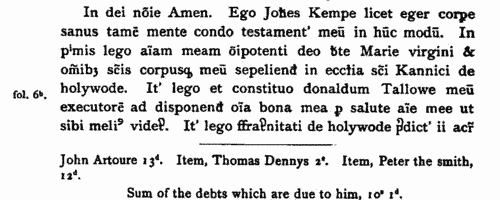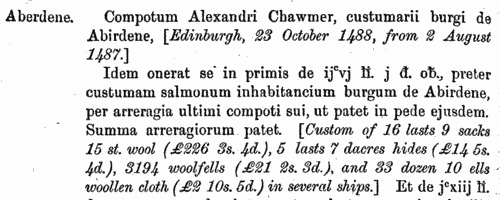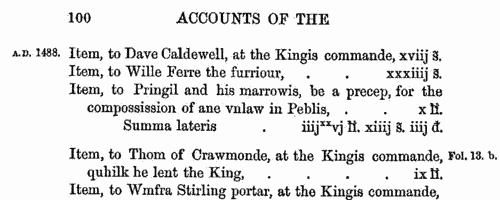Cor Surname Ancestry ResultsOur indexes 1000-1999 include entries for the spelling 'cor'. In the period you have requested, we have the following 18 records (displaying 1 to 10): Buy all | | | Get all 18 records to view, to save and print for £96.00 |
These sample scans are from the original record. You will get scans of the full pages or articles where the surname you searched for has been found. Your web browser may prevent the sample windows from opening; in this case please change your browser settings to allow pop-up windows from this site. Lancashire Assizes
(1202-1285)
All the surviving records of the assizes held by the royal justices in eyre (itinerant) in Lancashire during this period were extracted by colonel John Parker and published by the Lancashire and Cheshire Record Society from 1904. The justices not only tried all civil actions outstanding on their advent, pleas of the crown and common pleas, but also interrogated the juries of each wapentake and borough as to the Capitula Itineries, the Articles of the Eyre, inquiring into the king's proprietary rights, escheats, wardships, and questions of maladministration. Only a dozen complete rolls survive for this period; but Appendix I (pp. 218-253) gathers together from the Patent Rolls of the reign of Henry III (1216-1272) a schedule of Lancashire assizes for which justices were assigned; and Appendix II (306-342) adds the fines and amercements before the justices during that reign, as recorded on the Pipe Rolls.COR. Cost: £4.00.  | Sample scan, click to enlarge

| Freemen of Dublin
(1473)
The franchise rolls of the city of Dublin record the admissions of new freemen, by special grace, having served apprenticeship, or as child or son-in-law of a freeman, each fourth Friday after Easter, Midsummer, Michaelmas and Christmas each year.COR. Cost: £6.00.  | Sample scan, click to enlarge

| Freemen of Dublin
(1474)
The franchise rolls of the city of Dublin record the admissions of new freemen, by special grace, having served apprenticeship, or as child or son-in-law of a freeman, each fourth Friday after Easter, Midsummer, Michaelmas and Christmas each year.COR. Cost: £6.00.  | Sample scan, click to enlarge

| Dublin diocese testators and legatees
(1457-1483)
This register of testaments or wills and inventories from the diocese of Dublin in the time of archbishops Tregury and Walton (now in the Library of Trinity College, Dublin) was printed with a translation by the Royal Society of Antiquaries of Ireland in 1896-7. The inventory usually comes first, and often includes names of debtors and creditors to the testator. The diocese of Dublin did not extend far into the Pale; but the province of Dublin, over which the archbishops had prerogative probate jurisdiction, included the southern half of Ireland, but virtually all these wills are from the city of Dublin or close at hand.COR. Cost: £4.00.  | Sample scan, click to enlarge

| Clergy, the religious and the faithful in Britain and Ireland
(1471-1484)
These are abstracts of the entries relating to Great Britain and Ireland from the Lateran and Vatican Regesta of pope Sixtus IV. Many of these entries relate to clerical appointments and disputes, but there are also indults to devout laymen and women for portable altars, remission of sins, &c. This source is particularly valuable for Ireland, for which many of the key government records of this period are lost. Many of the names in the text were clearly a puzzle to the scribes in Rome, and spelling of British and Irish placenames and surnames is chaotic. Sixtus IV was consecrated and crowned 25 August 1471 (the day from which his pontificate is dated) and died at Rome 12 August 1484. The extracts were made by J. A. Twemlow from Vatican Regesta dxlvi to dclxxxi and Lateran Regesta dccxiii to dcccxxxviii, and published in 1955. Not all the Lateran registers survive from this pontificate, but were still in existence in the 18th century, when indexes were compiled giving rubricelle, or brief summaries of the papal bulls; nor, indeed, have all these indexes now survived, but Twemlow added an appendix listing all the rubricelle relating to the British Isles extant for the reign of Sixtus IV.COR. Cost: £4.00.  | Sample scan, click to enlarge

| Officers and tenants of the Scottish crown
(1488-1496)
In 1887 the 10th volume of Rotuli Scaccarii Regum Scotorum, or The Exchequer Rolls of Scotland, was published in Edinburgh as part of the Scottish Series of Chronicles and Memorials. The main text is a transcript in extended Latin, but with some passages reduced to an abstract in English (in italics), of the rolls of the Scottish royal exchequer from 19 June 1488 to 12 October 1496 (rolls cclxxviii to ccxcv, old numbers ccxciii to cccix). This more or less continuous series alternates between accounts of the Ballivi ad Extra (royal chamberlains, lessees of lordships, rangers of wards, receivers &c) and those of the Custumars (receivers of customary payments and similar revenues) and bailies (bailiffs) of burghs (boroughs). In all, they give a summary description of all these sources of royal revenue - and not only mention the payers and receivers in general, but also refer to many occasional payments to and receipts from individuals hardly otherwise found in the surviving records. An appendix (pages 629 to 763) of rentals of royal property throughout Scotland in the same period gives a rich harvest of personal names; and another (764-772), an Index in Libros Responsionum, lists persons to whom sasine (seisin) was granted in 1492 to 1496.COR. Cost: £4.00.  | Sample scan, click to enlarge

| Servants of the Scottish crown
(1473-1498)
Under the direction of the Lord Clerk Register of Scotland, the earliest Accounts of the Lord High Treasurer of Scotland, under the series Compota Thesauriorum Regum Scotorum, were abridged and published. This first volume, prepared by Thomas Dickson, curator of the Historical Department of the General Register House, was published in 1877. It contains the earliest surving accounts, from 1473 to 1474 in the reign of king James III, and the next, from 1488 to 1489 in the reign of king James IV. These were printed verbatim; but there then follow (page 166 onwards) accounts through to 1498 'considerably curtailed by the omission of unimportant entries'. These accounts are mostly lists of royal expenditure: many purchases of items for the court do not give the name of the merchants from whom they were bought, so the bulk of the personal names in the text are those of intermediaries, messengers, and various servants of the king.COR. Cost: £4.00.  | Sample scan, click to enlarge

| Scottish litigants, rebels and cautioners
(1578-1585)
The Privy Council of Scotland exercised a superior judicial authority in the kingdom, and consequently received and dealt with a constant stream of petitions, as well as dealing with the internal security of the state. This register of the council from 17 June 1578 to 31 July 1585, in the reign of king James VI, was edited by David Masson, and published under the direction of the Lord Clerk Register of Scotland in 1880. Some of the individuals mentioned are the complainants, those of whom they complained, and the sureties on both sides: at this period, some of the complainants are alleging serious attacks, often of a feuding nature. Many of the bonds entered into by the cautioners are promises to keep the peace towards such enemies. Failure to answer to the council when summoned was a serious contempt, leading to being denounced a rebel, with serious consequences. But 'horning' was also used in the pursuit of debts: there was no imprisonment for debt in Scotland, but a creditor could have an obstinate debtor ordered, in the sovereign's name, to pay what was due, failing which, the debtor could be put to the horn, denounced as a rebel, and imprisoned as a rebel. The main text (to page 762) is from the Acta Secreti Concilii, containing the minutes of the Privy Council, and of occasional Conventions of the Estates. After that are printed some miscellaneous Privy Council documents from the same years. The sources most productive of names, the Acta Cautionis and Registration of Bands, are also the most repetitive in form, and are not transcribed verbatim and literatim: nevertheless, one of the editor's rules was for 'All proper names and names of places occurring in the originals to be preserved in the abstracts without exception, and in the exact original spelling.'
COR. Cost: £4.00.  | Sample scan, click to enlarge

| Scottish litigants, rebels and cautioners
(1585-1592)
The Privy Council of Scotland exercised a superior judicial authority in the kingdom, and consequently received and dealt with a constant stream of petitions, as well as dealing with the internal security of the state. This register of the council from 1 August 1585 to 31 July 1592, in the reign of king James VI, was edited by David Masson, and published under the direction of the Lord Clerk Register of Scotland in 1881. Some of the individuals mentioned are the complainants, those of whom they complained, and the sureties on both sides: at this period, some of the complainants are alleging serious attacks, often of a feuding nature. Many of the bonds entered into by the cautioners are promises to keep the peace towards such enemies. Failure to answer to the council when summoned was a serious contempt, leading to being denounced a rebel, with serious consequences. But 'horning' was also used in the pursuit of debts: there was no imprisonment for debt in Scotland, but a creditor could have an obstinate debtor ordered, in the sovereign's name, to pay what was due, failing which, the debtor could be put to the horn, denounced as a rebel, and imprisoned as a rebel. The main text (to page 774) is from the Acta Secreti Concilii, containing the minutes of the Privy Council, with intermixed Acta Proper (political edicts), Decreta (judicial decisions), Acta Cautionis (acts of caution) and Bands (registration of bonds). After that are printed some miscellaneous Privy Council documents from the same years: additional acts of caution (775-778); ordinances and acts anent the Borders and the North (779-814); and miscellaneous privy council papers (815-834). The sources most productive of names, the Acta Cautionis and Registration of Bands, are also the most repetitive in form, and are not transcribed verbatim and literatim: nevertheless, one of the editor's rules was for 'All proper names and names of places occurring in the originals to be preserved in the abstracts without exception, and in the exact original spelling.'
COR. Cost: £4.00.  | Sample scan, click to enlarge

| Scottish litigants, rebels and cautioners
(1592-1599)
The Privy Council of Scotland exercised a superior judicial authority in the kingdom, and consequently received and dealt with a constant stream of petitions, as well as dealing with the internal security of the state. This register of the council from August 1592 to May 1599, in the reign of king James VI, was edited by David Masson and published under the direction of the Deputy Clerk Register of Scotland in 1882. The publication brings together the contents of the principal register (Acta Secreti Concilii) with acts and bands (bonds) of caution (surety) from the registers called Acta Cautionis (pp 561-730); Acts and Ordinances relating to the Borders and the North (731-748); and Miscellaneous Privy Council Papers (749-769). Many of the individuals mentioned are the complainants, those of whom they complained, and the sureties on both sides: at this period, many of the complainants are alleging serious attacks, often of a feuding nature. Many of the bonds entered into by the cautioners are promises to keep the peace towards such enemies. Failure to answer to the council when summoned was a serious contempt, leading to being denounced a rebel, with serious consequences.
COR. Cost: £4.00.  | Sample scan, click to enlarge

|
| 1 | 2 |  |
Research your ancestry, family history, genealogy and one-name study by direct access to original records and archives indexed by surname.
|












